Agricultural Case Studies
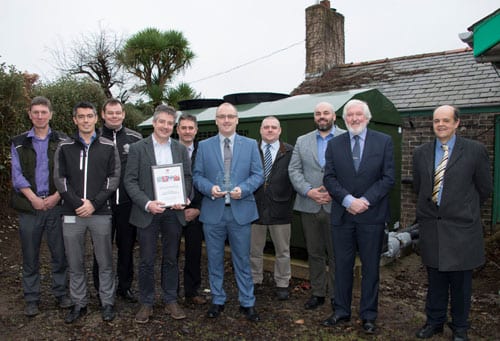
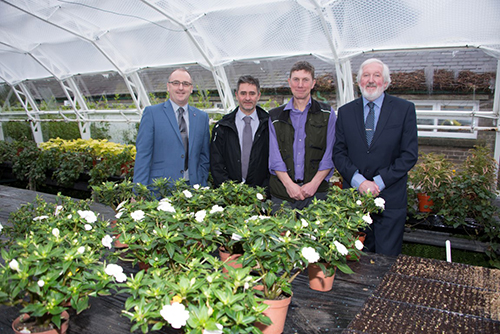
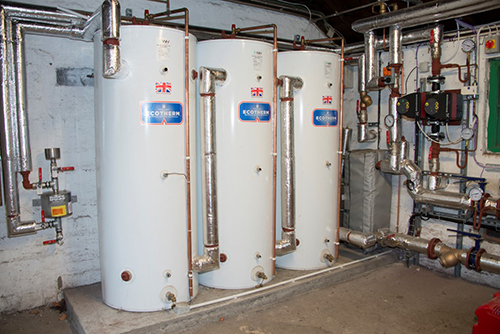
Douglas Borough Council
Douglas Borough Council has become the first local authority to use renewable energy technology – an air source heat pump (ASHP) – to heat its greenhouses.
The nursery’s oil heating system was coming to the end of its economically viable life and after careful analysis it became clear an air source heat pump would not only reduce the Council’s carbon footprint, but would also lead to savings on fuel oil, estimated to be in the region of £12,000 annually from April 2017. In addition to this, the electrical power for the pump attracts a reduced tariff so this new system is not only environmentally responsible and cost effective but will also, in the longer-term, help to lessen the impact on the rates.
Features of our ASHP include a remote monitoring facility to ensure that our heat pumps are monitored 24/7 and that they are built for 25 years reliability.
‘Douglas Borough Council is to be complimented on this installation that will not only reduce fossil fuel use but also carbon emissions to near zero, so the Council is not only reducing its carbon emissions but also saving money by reducing the spend on oil.’
The air source heat pump installed at Ballaughton Nurseries is probably the largest installation on the Island – and definitely the first horticultural application – and will make a substantial contribution to reducing the Isle of Man’s carbon emissions. It is forecast to deliver significant cost savings by removing the dependence on heating oil to keep the greenhouses and nursery plants warm during the cold winter months.’
Flat Deck Weaner Shed
GES heating control was installed on a 48 crate weaning shed. Over three separate cycles the heat usage was compared between the GES heating control strategy systems and the previous heating control. Huge savings were seen by the GES heating control strategy.
Over the three cycles an average of £298 was saved with annual savings of £3,580. This is based on 12 cycles per year.
For more information on how much money this heating solution could save you and your business please feel free to get in touch.
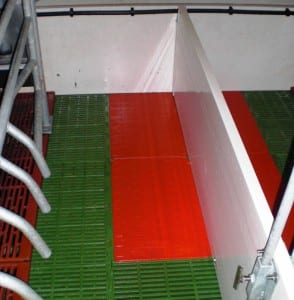
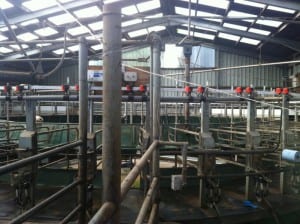
Dairy Farm Pre-Heat with Heat Pump
Costs for water heating on a dairy farm can easily exceed £5,000 a year. The standard approach of using a large immersion heater when compared to a heat pump is highly inefficient. An air source heat pump can generate 3-4 times the heat energy for every unit of electricity used offering significant savings.
For hot washes, where water temperatures of 90°C are needed, the heat pump is used as a pre-heater before being boosted to 90°C for use by either an existing system such as a Cotswold dairy heater or Springfield dairy heater.
Where the farmhouse is close to the dairy there is the possibility to use Global Energy Systems’ unique ability to produce hot water simultaneously with heating at no additional cost. In this case the hot water for the house would be boosted whenever the heat pump was warming water for the dairy, offering further savings for the farmer.
Fish Farm with Air Source Heat Pump
This innovative fish farming project wanted a sustainable and easily installed heating solution. The four tanks are each enclosed in a geodisic dome and a mixture of shrimp and aquaponics are supported.
The 15kW air source heat pump has already been tested down to -4°C and the trial will allow estimates for the annual running costs to be determined.
The use of an air source heat pump means that electricity is the sole power requirement for the project, avoiding expensive connection charges or the high running costs of oil or LPG. The farm has a strong sustainability focus and the carbon savings, against any fossil fuel are welcomed.
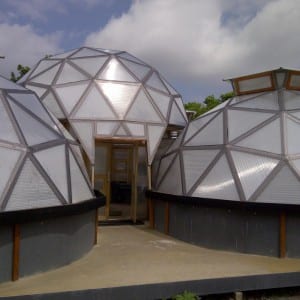
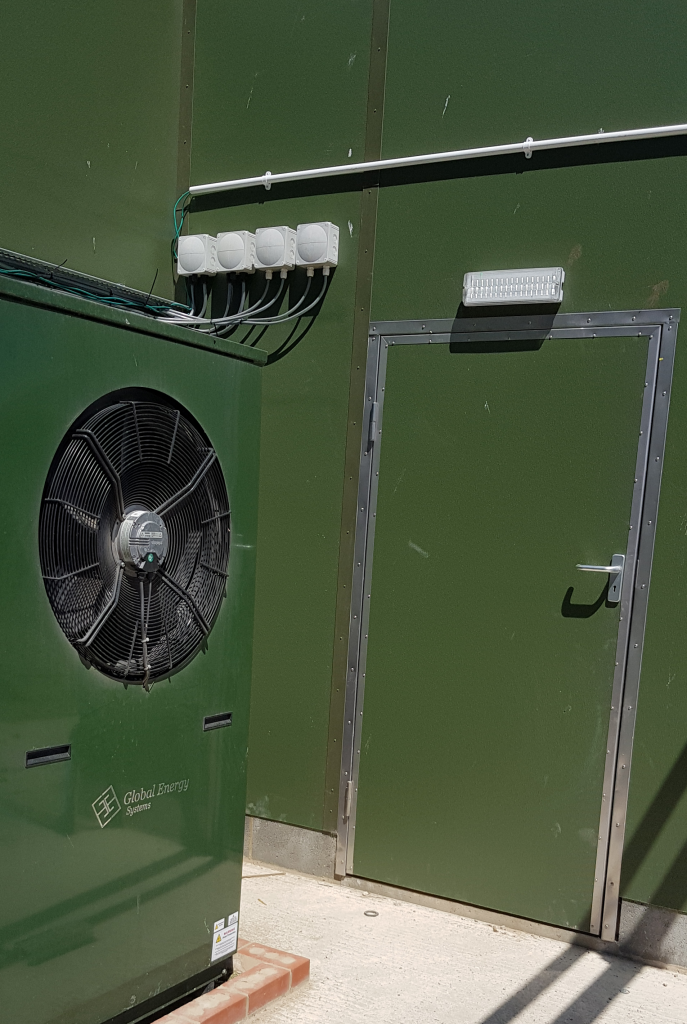
Farrowing House with Heat Pump
This 32 crate farrowing house was constructed in 2010. Designed for under floor fed heat pads, an air source heat pump was an ideal solution to minimise emissions and bills.
A single 9kW Air Source Heat Pump provides heat for the system. In 2012 the annual running costs estimate was £980. Based on a 6 week farrowing cycle, this amounts to just £4 a day and 3.7 tonnes of carbon emissions.
The farmer’s previous farrowing house had used heat lamps. The new building and new heating systems has seen yields improve and running costs drop from £40 a day to £4 a day.
Global Energy Systems now work with key building and heating suppliers for farrowing houses and weaning houses, using heat pumps to provide sustainable, affordable heat. Large scale installations with multiple heat pumps offer a simple to install, electrical based system that can be combined with solar PV installations for further savings.
The use of heat pumps for farrowing has now been extended into multiple shed, 100+ crate systems. Heat pump based weaner house systems have also been developed, offering significant savings.
One farmer in Ireland estimates that he is saving 2 Euros a pig through the installation of GES heat pumps on his farrowing sheds.
Pig Rearing Mats
This large new build with 9 rooms came straight to Global Energy Systems to heat the pig rearing mats. The farmer has been using our Air Source Heat Pumps for years on different buildings, this one being the biggest he wanted to ensure that he could save as much money on his energy costs as possible.
Five 18kW Caernarfon air source heat pumps were installed and have been keeping the temperatures set by our heating control strategy. Annual savings for this install are £6,000 which includes payments from the RHI Non domestic scheme which has been accepted.
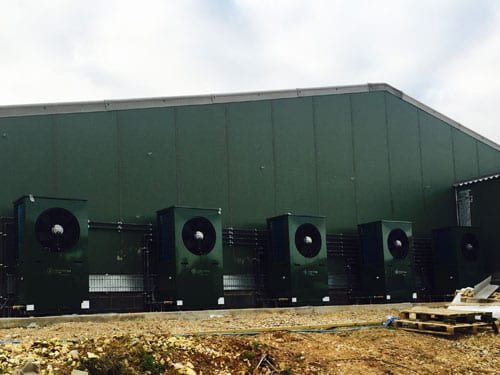
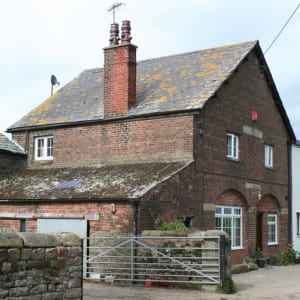
Farm House with Air Source Heat Pump
Set in rural Lancashire with no access to mains gas, the owners of this farm house wanted to escape their dependence on oil.The installation of a Global Energy Heat Pump has reduced their annual heating and hot water bill to £912, with a saving of £1026.
The Air Source Heat Pump has been installed at the rear of an open garage with the cold air being ducted out through the roof. This allowed the secluded rear garden and flower beds to remain undisturbed and offered a simple link into the existing heating system through the house wall. Several radiators in the house were upgraded to ensure all rooms were able to reach the desired temperature using a heat pump.
The owners have commented that they have been delighted with the savings.

